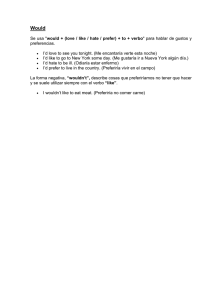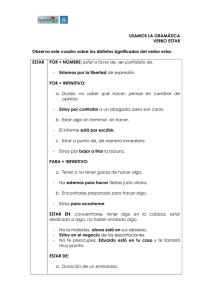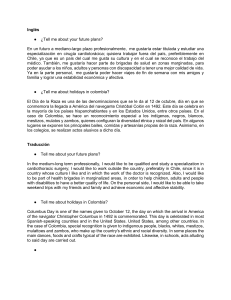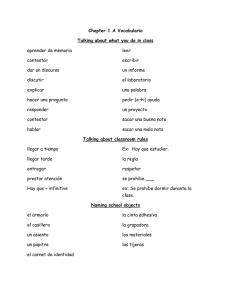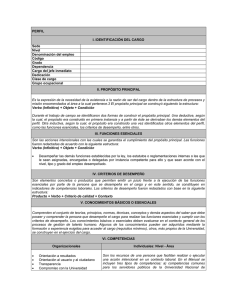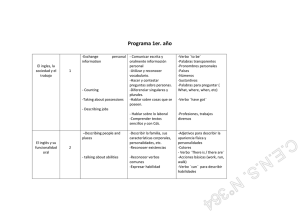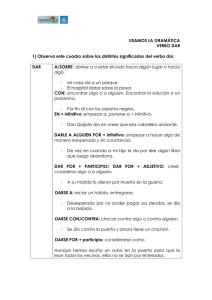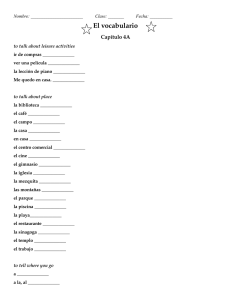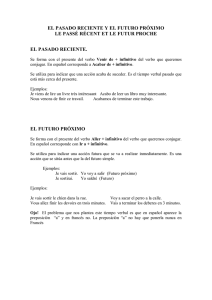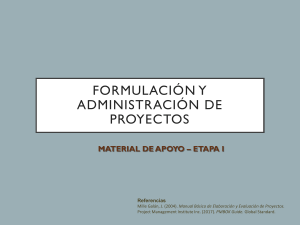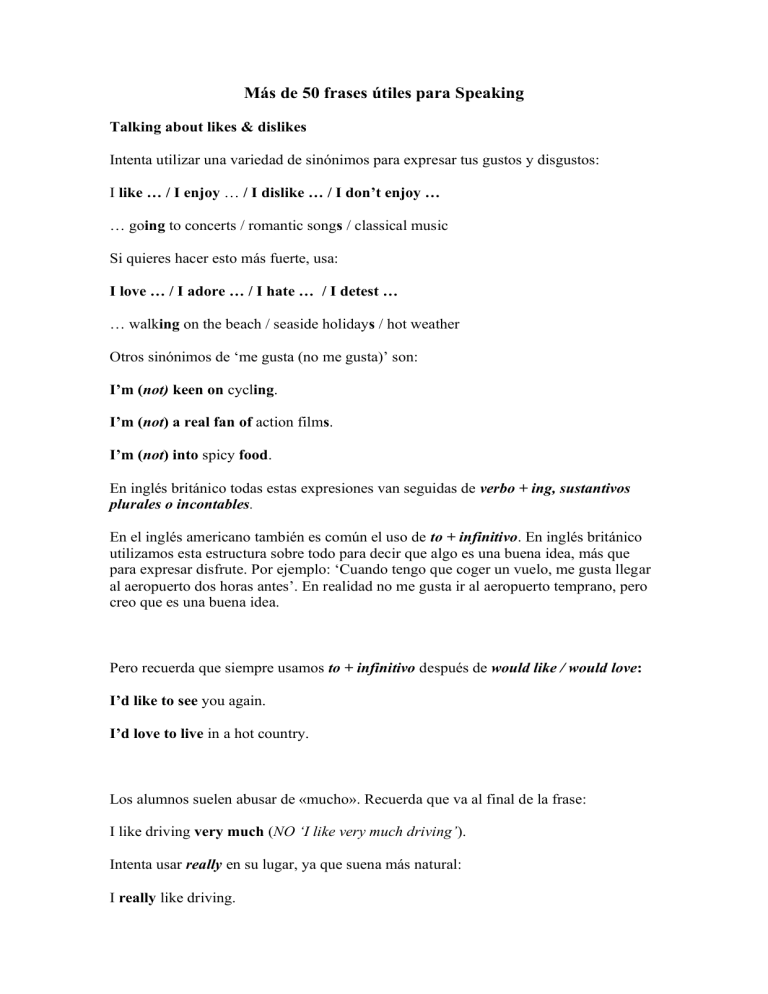
Más de 50 frases útiles para Speaking Talking about likes & dislikes Intenta utilizar una variedad de sinónimos para expresar tus gustos y disgustos: I like … / I enjoy … / I dislike … / I don’t enjoy … … going to concerts / romantic songs / classical music Si quieres hacer esto más fuerte, usa: I love … / I adore … / I hate … / I detest … … walking on the beach / seaside holidays / hot weather Otros sinónimos de ‘me gusta (no me gusta)’ son: I’m (not) keen on cycling. I’m (not) a real fan of action films. I’m (not) into spicy food. En inglés británico todas estas expresiones van seguidas de verbo + ing, sustantivos plurales o incontables. En el inglés americano también es común el uso de to + infinitivo. En inglés británico utilizamos esta estructura sobre todo para decir que algo es una buena idea, más que para expresar disfrute. Por ejemplo: ‘Cuando tengo que coger un vuelo, me gusta llegar al aeropuerto dos horas antes’. En realidad no me gusta ir al aeropuerto temprano, pero creo que es una buena idea. Pero recuerda que siempre usamos to + infinitivo después de would like / would love: I’d like to see you again. I’d love to live in a hot country. Los alumnos suelen abusar de «mucho». Recuerda que va al final de la frase: I like driving very much (NO ‘I like very much driving’). Intenta usar really en su lugar, ya que suena más natural: I really like driving. A menudo se pregunta por tus cosas favoritas, o por lo que crees que es bueno o malo de algo. Recuerda utilizar superlativos: One of my favourite / least favourite songs (+ plural noun) is Heroes. My favourite / least favourite film of all time is Bladerunner. The best / worst thing about my job is having (verb + ing) to get up early. The thing I like most / least about my flat is its size. Talking about hobbies and ability Recuerda utilizar la forma -ing para hablar de tus aficiones: My hobbies are listening to music / swimming / making models. Las preposiciones siempre van seguidas de verbo + ing, sustantivos plurales o incontables: I’m interested in … … keeping fit / sports / health and fitness I’m good at … / I’m not very good at … … playing the guitar / languages / music Talking about the present, routines & habits Los adverbios de frecuencia van antes del verbo principal, excepto el verbo to be: I always go to the countryside at weekends (adverbio + verbo) I’m hardly ever bored (to be + adverbio) Aumente el nivel de la respuesta combinando estas expresiones con una frase condicional: If I have some free time, I usually watch my favourite series. I always go to the beach if the weather’s good. Utiliza también expresiones de frecuencia: We go abroad every / each year. We go to the mountains once / twice / three times a year (estas expresiones suelen ir al final de la frase). Talking about the past & your experience Recuerda que ago va al final de la frase cuando hablas de acciones o estados terminados: I worked in Germany six years ago. Intenta utilizar una variedad de formas de pasado, no sólo el pasado simple. Utiliza used to + infinitivo para hablar de acciones o estados repetidos en el pasado: I used to play outside a lot when I was a child. I used to live in London. También puedes usar would + infinitivo para hablar de acciones pasadas repetidas, pero no de estados pasados: I would play outside a lot (NO ‘I would live in London’). En el examen suelen preguntarte por tus primeros recuerdos o experiencias especiales. Aquí tienes algunas buenas maneras de empezar a hablar de ellos: I remember one particular time when I had a problem at work. The most memorable occasion was my fifth birthday party. I can’t remember the last time I read a book. It was when I was living in the capital city … I’ve never been (present perfect) abroad. I’ve travelled (present perfect) abroad many times. Recuerda que, si utilizas el presente perfecto para describir cuánto tiempo ha durado algo, utiliza for + period of time o since + a point in time: I’ve lived here for five days / six months / ten years I’ve lived here since 2010 / December / I was born Talking about future plans & making predictions La forma de futuro que utilicemos depende de lo seguros que estemos de nuestros planes. present continuous: to be + verb+ing I’m flying to London (ya tengo mi billete). I’m visiting my cousins (me están esperando). to be + going to + infinitive I’m going to stay in Seville (esa es mi intención). We’re going to relax at home (esa es nuestra intención). perhaps / maybe + will + infinitive OR might + infinitive Perhaps I’ll go on holiday, or maybe I’ll stay at home (aún no lo he decidido). I might go on holiday, or I might stay at home (aún no lo he decidido). Eleva el nivel de tu respuesta utilizando una primera condicional: If it rains (present simple), I’ll stay (will + infinitive) at home. También utilizamos will + infinitivo para hacer predicciones generales: There’ll probably be a lot of traffic on the roads. I don’t think we’ll have any problems. People will probably live on another planet in the future. Talking about advantages and disadvantages There are advantages and disadvantages to living in a big city. (Aquí to es una preposición, por lo que necesita verbo + ing) Intenta usar sinónimos para la variedad: These are some of the pros and cons. The main advantage is probably the nightlife. Another point in favour is the variety of entertainment. The biggest drawback for most people is the cost of accommodation. Other disadvantages are noise and pollution. Y recuerda usar conectores: Firstly, there are more job opportunities. What’s more, salaries are higher. On (the) one hand, there are more schools. On the other hand, it’s not very safe for young children. Expressing opinions & giving reasons Utilizar los verbos auxiliares modales (+ infinitivo) y verbos similares como ought to y need to: I think people should wear face-masks in the street. Intenta utilizar una variedad de sinónimos para expresar tus opiniones, en lugar de limitarte a repetir ‘I think …’. In my opinion, we ought to show more respect for each other. As I see it, the government could do more. If you ask me, richer countries need to help poorer countries. To my mind, we must be kinder to each other. To tell you the truth, I haven’t decided yet. I have mixed feelings about whether to go to the UK this summer. In my experience, it’s always better to tell the truth. Y aquí hay algunas expresiones para dar razones: There are many reasons, including salary and job satisfaction. The main reason is job satisfaction. That’s why I decided to change career. Expressing preferences and making choices Para expresar tus preferencias generales, utiliza prefer y la preposición to: I prefer swimming to playing tennis (+ verbo + ing) I prefer dogs to cats (+ sustantivo plural) I prefer rock to rap (+ sustantivo incontable) Para expresar una preferencia particular para el futuro, utilicewould prefer + to + infinitive: I usually prefer the theatre to the cinema, but tonight I’d prefer to see a film. Utiliza than para expresar la misma idea al revés: I’d prefer to see a film tonight than to go to the theatre. También puedes utilizar would rather + infinitive (SIN to): I’d rather see a film tonight than go to the theatre. A menudo hay que elegir entre dos opciones. Una expresión útil es it depends. Esta expresión va seguida de on: I’m not sure – it depends on … … the weather / the price / how old you are Este es un buen momento para elevar el nivel utilizando el segundo condicional: If I had to (past simple) choose, I’d say (would + infinitive) big cities are best. If possible, I’d live in a village. It’s hard to decide, but I think I’d choose a town. Ganar tiempo A veces es difícil pensar en una respuesta de inmediato y hay que ganar tiempo. Así que aquí tienes algunas expresiones útiles para darte tiempo a pensar: That’s a good question … Let me think … I’m not quite sure … Well, it’s hard to say … I’ve never thought about that before … I suppose it would depend on several things …
